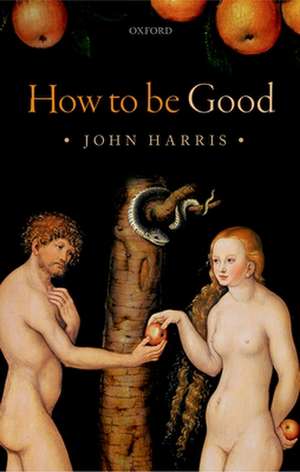How to be Good: The Possibility of Moral Enhancement
Autor John Harrisen Limba Engleză Hardback – 7 apr 2016
There are many proposed methodologies or technologies for moral enhancement. Some of them are ancient and/or familiar: we may attempt moral enhancement by setting a good example, by good parenting, by education or training, by peer pressure, by telling stories with a moral, in words or in pictures, and so on. We can imbibe substances with mood changing or motivational effects. We can also use medical, biological, or other scientific means; we can search for and deploy chemicals, or biological or molecular agents, which we believe will change people for the better; and we can modify the environment to make bad outcomes of all sorts less likely. We can experiment with political and social systems, institutions, and arrangements designed to make the world a better place or people better people. The question whether and to what extent moral enhancement is possible is the subject of this book.
| Toate formatele și edițiile | Preț | Express |
|---|---|---|
| Paperback (1) | 183.00 lei 10-16 zile | |
| OUP OXFORD – 3 aug 2018 | 183.00 lei 10-16 zile | |
| Hardback (1) | 335.36 lei 31-37 zile | |
| OUP OXFORD – 7 apr 2016 | 335.36 lei 31-37 zile |
Preț: 335.36 lei
Preț vechi: 360.66 lei
-7% Nou
64.18€ • 66.76$ • 52.98£
Carte tipărită la comandă
Livrare economică 02-08 aprilie
Specificații
ISBN-10: 0198707592
Pagini: 210
Dimensiuni: 141 x 222 x 17 mm
Greutate: 0.38 kg
Editura: OUP OXFORD
Colecția OUP Oxford
Locul publicării:Oxford, United Kingdom
Descriere
'How to be Good?' is the pre-eminent question for ethics, although one that philosophers and ethicists seldom address head on. Knowing how to be good, or perhaps (more modestly and more accurately) knowing how to go about trying to be good, and the ways in which it is pointless or self-defeating to try to be good, is of immense theoretical and practical importance. And what goes for trying to be good oneself, goes also for trying to provide others with ways of being good, and for trying to make them good whether they like it or not. This is what is meant by 'moral enhancement'.
There are many proposed methodologies or technologies for moral enhancement. Some of them are ancient and/or familiar: we may attempt moral enhancement by setting a good example, by good parenting, by education or training, by peer pressure, by telling stories with a moral, in words or in pictures, and so on. We can imbibe substances with mood changing or motivational effects. We can also use medical, biological, or other scientific means; we can search for and deploy chemicals, or biological or molecular agents, which we believe will change people for the better; and we can modify the environment to make bad outcomes of all sorts less likely. We can experiment with political and social systems, institutions, and arrangements designed to make the world a better place or people better people. The question whether and to what extent moral enhancement is possible is the subject of this book.
Recenzii
Notă biografică
John Harris is Emeritus Professor of Bioethics at the University of Manchester. His books include: The Value of Life (Routledge, 1985), Wonderwoman and Superman (OUP, 1992), Clones Genes and Immortality (OUP, 1998). He is the author or editor of twenty books and over three hundred and fifty papers.
Cuprins
1 Introduction; 2 What it's Like to be Good: Individual Responsibility; 3 Taking the Human out of Human Rights; 4 Moral Enhancement and Freedom; 5 Taking Liberties with Free Fall; 6 The God Machine, the God Delusion, and the Death of Liberty; 7 'Ethics is for Bad Guys': Putting the 'Moral' into Moral Enhancement; 8 Molecules and Morality; 9 Moral Progress and Moral Enhancement; 10 Mind Reading and Mind Misreading; 11 The Safety of the People; 12 Persons or Machines; Acknowledgements; Index
























